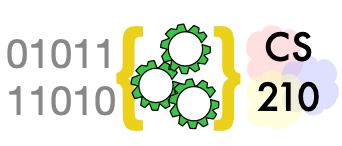Indefinite loops#
Loops that iterate through the elements of a collection are most common, but a loop can also be written to iterate as long as some condition holds. Sometimes such a loop is useful even when we are iterating through collections, but not stepping through them at a pace of one item per iteration.
Example: Merging sorted lists#
Suppose we want to merge two lists that are already in sorted order. While we could just concatenate and then sort short lists, that approach would not be good if the lists had millions of elements, or if instead of lists in memory we were reading two streams of network data and producing a merged output stream. In that case we would need a loop that advances through just one or the other list on each iteration. I’ll illustrate with short lists:
# My lists of precious and cheap rocks are each sorted
precious = ["amber", "amethyst", "diamond", "ruby"]
cheap = ["basalt", "granite", "pumice", "shale"]
# I want to combine them into one sorted list
# Start at the beginning of each list
i_precious = 0
i_cheap = 0
rocks = []
while i_precious < len(precious) and i_cheap < len(cheap):
# We'll add one element to rocks on each iteration,
# but it could come from either the precious or the cheap list.
if precious[i_precious] < cheap[i_cheap]:
rocks.append(precious[i_precious])
i_precious += 1
else:
rocks.append(cheap[i_cheap])
i_cheap += 1
# One of the lists, cheap or precious, has not been used up.
# One of these two loops will execute zero times, and one will
# execute at least once.
while i_precious < len(precious):
rocks.append(precious[i_precious])
i_precious += 1
while i_cheap < len(cheap):
rocks.append(cheap[i_cheap])
i_cheap += 1
print(rocks)
['amber', 'amethyst', 'basalt', 'diamond', 'granite', 'pumice', 'ruby', 'shale']
Breaking out#
The condition for finishing and exiting a loop is not always in the
while condition. Sometimes it is more convenient to place the
test somewhere in the body of the loop. In that case we may write
what appears to be an infinite loop with while true:, and use the
break statement for the actual exit. The code for combining lists
of rocks could also be written with a single loop:
i_precious = 0
i_cheap = 0
rocks = []
while True:
if i_precious < len(precious) and i_cheap < len(cheap):
# Both lists have more items. Take the smallest.
if precious[i_precious] < cheap[i_cheap]:
rocks.append(precious[i_precious])
i_precious += 1
else:
rocks.append(cheap[i_cheap])
i_cheap += 1
elif i_precious < len(precious):
# Only precious rocks remain. Take the next.
rocks.append(precious[i_precious])
i_precious += 1
elif i_cheap < len(cheap):
# Only cheap rocks remain. Take the next.
rocks.append(cheap[i_cheap])
i_cheap += 1
else:
# Both lists are exhausted; we're done!
break
print(rocks)
['amber', 'amethyst', 'basalt', 'diamond', 'granite', 'pumice', 'ruby', 'shale']
Usually we want to be sure that the break statement will be
executed after a predictable number of iterations. In the loop
above, we can argue that each iteration adds one to either i_cheap
or i_precious, and that the total number of loop iterations will
be exactly len(precious) + len(cheap).
In some other situations it may be much harder to determine how many
times an indefinite loop could execute. For example, we may be
simulating a physical system until some condition holds, or trying
different solutions to a puzzle.
If we cannot be sure of eventually executing the break
statement, we could replace the while with a for to set an
upper limit on the number of iterations. That is the approach we
will take in this week’s project, in which the main loop is an
attempt to improve an assignment of events to geographic clusters.

